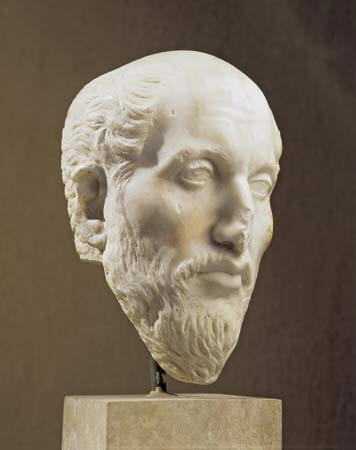

















![]()
... The works of [Plotinus] ... are particularly valuable to all who desire to penetrate into the depths of this divine wisdom. From the exalted nature of his genius, he was called Intellect by his contemporaries, and is said to have composed his books under the influence of divine illumination. Porphyry relates, in his life, that he was four times united by an ineffable energy with the divinity; which, however such an account may be ridiculed in the present age, will be credited by everyone who has properly explored the profundity of his mind. The facility and vehemence of his composition was such, that when he had once conceived a subject, he wrote as from an internal pattern, without paying much attention to the orthography, or reviewing what he had written; for the celestial vigor of his intellect rendered him incapable of trifling concerns, and in this respect, inferior to common understandings, as the eagle, which in its bold flight pierces the clouds, skims the surface of the earth with less rapidity than the swallow. ...
Thomas Taylor (1758-1835), from the Introduction to his translation of An Essay on the Beautiful by Plotinus, first published in 1792.
The English Platonist, Thomas Taylor (1758-1835), was the first scholar to use the term "Neoplatonic" to designate those philosophers who adhered to and further developed the metaphysical views of Plato during the third, fourth and fifth centuries of the Christian Era. The Alexandrian teacher, Ammonius Saccas (ca. 175-242 A.D.), is generally considered to be the founder of Neoplatonism. However, Plotinus (204-270 A.D.) and Proclus (410-485 A.D.) are unquestionably the greatest of the Neoplatonic philosophers.
Little is known of Plotinus' early years. He was born in the town of Lycopolus (Assiut) in Upper Egypt and, as a young man, studied under several teachers in the city of Alexandria. At the age of twenty-seven, he met Ammonius Saccas and immediately became his disciple; on meeting that master, Plotinus purportedly exclaimed: "I have found the man I need." He studied under Saccas for eleven years, until the death of his teacher in about 242 A.D. Now aged 38, Plotinus joined a military expedition to Persia under the Roman Emperor Gordian III, where he obtained a knowledge of Eastern religion and philosophy. Unfortunately, the expedition ended in failure and the assassination of Gordian. Plotinus barely escaped with his life. Shortly thereafter, he went to Rome, at age 40, where he remained for the next twenty years.
In Rome, Plotinus taught philosophy and became widely respected for the quality of his teaching, high moral life style and ethics. Plotinus was an ascetic who spent much of his time in meditation; he is purported to have attained a state of higher consciousness on at least four occasions. He believed these experiences to be the highest achievements of his life. During his last years of life, Plotinus retired to Campania, where he wished to establish a community of philosophers; however, he died before anything was accomplished. Plotinus died during the last year of the reign of the Emperor Claudius II in 270 A. D. In about 301 A.D., Porphyry, an important Plotinian disciple, organized the various extant writings of Plotinus into six groupings of nine parts each. This collection of writings, prefaced by a brief biographical sketch entitled The Life of Plotinus, was henceforth collectively referred to as the Enneads.
![]()